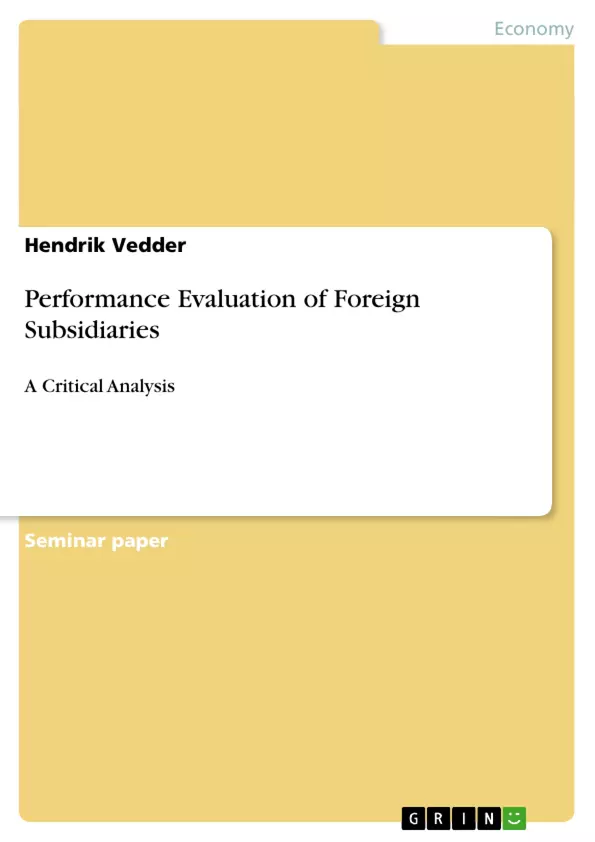Long before the globalisation had become a buzz word and an impetus for companies to
invest abroad, enterprises enlarged their “business playing field” into foreign countries
for various reasons, such as to capture a new market, to secure resources, or to take advantage
of local cost levels. Therefore, subsidiaries are heavily involved in the value
creation process for and within multinational corporations (MNCs). However, despite
the fact that the measurement of performance is crucial for globally active companies
not only in steering the value creation for the MNC but also, for example, in fostering
international expansion or guiding resource allocation, MNCs differ significantly in the
extent to which they are aware of the performance of their subsidiaries.
Due to the fact that strategic decisions regarding the global expansion of a MNC require
a wide and clear information basis to be able to assess how successfully a foreign subsidiary
has conducted its business or under what possibly unfavourable environmental
conditions the business results were achieved, multinational enterprises have to implement
a system for evaluating the performance of their foreign subsidiaries and their
management. Therefore, this paper aims to analyse the central aspects to consider in the
evaluation of the performance of foreign subsidiaries.
This paper is divided into five chapters. After a short introduction to the theoretical
background of performance evaluation in chapter 2, the paper continues in chapter 3
with the central issues of an effective performance evaluation system for foreign subsidiaries
with a clear focus on the aspect of separating managerial and subsidiary performance.
Then chapter 4 illustrates the measures used for evaluating foreign subsidiary
performance. Finally, the paper concludes by emphasising that an MNC can properly
evaluate the performance of it foreign subsidiaries only by considering the specific environmental
factors of the foreign country, separating managerial and subsidiary performance,
and supplementing financial with nonfinancial measurements.
[...]
Inhaltsverzeichnis (Table of Contents)
- Introduction
- Theoretical Background of Performance Evaluation
- Theoretical Concepts of Performance Evaluation
- Performance Evaluation in Multinational Corporations
- Designing an Effective Performance Evaluation System for MNCs
- Treatment of the Foreign Operation
- Separating Managerial and Subsidiary Performance
- Noncontrollable Factors in the External Environment
- Noncontrollable Factors in the Internal Environment
- Measures for Performance Evaluation of Foreign Subsidiaries
- Financial Performance Measures
- Nonfinancial Performance Measures
Zielsetzung und Themenschwerpunkte (Objectives and Key Themes)
This paper aims to analyze the central aspects to consider in the evaluation of the performance of foreign subsidiaries. It examines how multinational corporations (MNCs) can effectively measure the success of their foreign operations, considering the complexities of global business.
- Performance evaluation in multinational corporations
- Designing effective performance evaluation systems for foreign subsidiaries
- Separating managerial and subsidiary performance
- Appropriate measures for evaluating foreign subsidiary performance (financial and non-financial)
- The impact of environmental factors on subsidiary performance
Zusammenfassung der Kapitel (Chapter Summaries)
Introduction: Briefly introduces the increasing importance of evaluating foreign subsidiary performance for multinational corporations due to globalization and foreign investment.
Theoretical Background of Performance Evaluation: This chapter lays the groundwork by exploring existing theories and concepts related to performance evaluation, specifically within the context of multinational corporations.
Designing an Effective Performance Evaluation System for MNCs: This section delves into the critical elements of creating a robust performance evaluation system for foreign subsidiaries. A key focus is on differentiating between managerial performance and the performance of the subsidiary itself, acknowledging the influence of both internal and external factors beyond managerial control.
Measures for Performance Evaluation of Foreign Subsidiaries: This chapter outlines the various metrics used to assess the performance of foreign subsidiaries. It distinguishes between financial and non-financial measures, highlighting the importance of a comprehensive approach.
Schlüsselwörter (Keywords)
Performance evaluation, foreign subsidiaries, multinational corporations (MNCs), financial performance measures, non-financial performance measures, managerial performance, subsidiary performance, environmental factors, global expansion.
- Citation du texte
- Hendrik Vedder (Auteur), 2008, Performance Evaluation of Foreign Subsidiaries , Munich, GRIN Verlag, https://www.grin.com/document/119314



